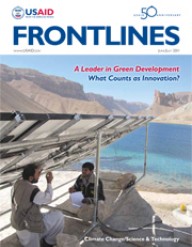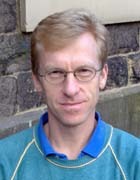Like many geographers working in international development, Ed Carr is skilled in a range of disciplines, worrying deeply about the relationship between science and society—or, as it might be phrased by the development community – between the research world that academics inhabit and “the real world” with which development practitioners contend.
Carr’s academic background is telling: he holds bachelor’s degrees in English, archaeology and American studies, a master’s degree in anthropology, and no less than two PhDs—one in anthropology, the other in geography.
And he’s all of 38.
A University of South Carolina associate professor, since 2010 Carr has been an American Association for the Advancement of Science Fellow at USAID, and is the climate change coordinator in the Bureau for Democracy, Conflict and Humanitarian Assistance.
In his discipline, Carr is one of a new generation of scholars addressing the relationships among development, environment, and society in Africa and who are currently carving out what will be agendas for research over the next 15 years or so.
Compared with earlier generations, these younger scholars are theoretically catholic (though not chaotic), constructively critical, and above all interested in exploring new interfaces: between development and health, livelihoods and ecosystems, environmental history and land use, development and the human dimensions of global change, among others.
These are scholars who not only believe that statistics, ethnographic insight, cartographic visualization, and historical analysis are equally valid methodological choices—they also practice their beliefs, and combine these approaches in their work. In a similar spirit, they resist efforts to separate nature and society as independent domains of inquiry and action, insisting instead that each are present in almost alldevelopment problems, that environmental questions cannot be asked without also including social analysis, and that, likewise, socio-economic questions can rarely be addressed separately from the environment. And all the while they tack back and forth between theory and practice.
Carr is very much at the vanguard of this group of geographers.
At the core of his research has been an interest in how local populations adapt to shifting economic and environmental conditions. He has conducted research in Ghana, Malawi, and countries in southern Africa. In its earlier years, Carr’s research sought to understand how far people’s livelihoods—which combine farming, off-farm income, migration and other ways of getting by—are adequate for dealing with the uncertainties of shifting prices, employment insecurity, volatile and changing climate, nature’s surprises, social and armed conflict, and more.
Among the many contributions of this work, one of the most important has been to show how socio-economic and gendered inequalities are often built into the way people get by (so while one family adapts to uncertainty, this might be at the cost of another family’s ability to do the same or of women’s ability to control their own labor and their own bodies). If this is so, he suggests, that external agencies should be cautious before celebrating local strategies: They may well be founded on forms of inequity and domination against which most who work in development seek to struggle.
Over time, Carr has used this strong foundation in field-based research—including two years living and working in rural Africa—to make links with policy and the work of other applied researchers. He has sought to link his own very on-the-ground research on livelihoods to the work of scientists trying to develop models of regional climate or land use change. The goal is to try to develop more realistic and accurate predictions of how livelihoods and resources will be affected by climate, and, on that basis, to elaborate more viable adaptation strategies. He has also worked closely with biophysical scientists to understand the relationships between livelihood and forest dynamics.
This work does not simply sit on the shelves of academic institutions. Indeed, Carr has been very active in linking his research to high-level policy initiatives. He has served as lead author on two influential global environmental publications and is currently review editor for a third.
Sitting at this interface of practice and theory, research and engagement, Ed Carr’s work is very important. It will continue to energize our discipline of geography, helping keep it relevant. And it will bring theoretical and field-based insight to the world of practice in ways that will help keep that work both critical and honest.
Anthony Bebbington is director of the Graduate School of Geography, and Higgins professor of environment and society at Clark University.











Comment
Make a general inquiry or suggest an improvement.